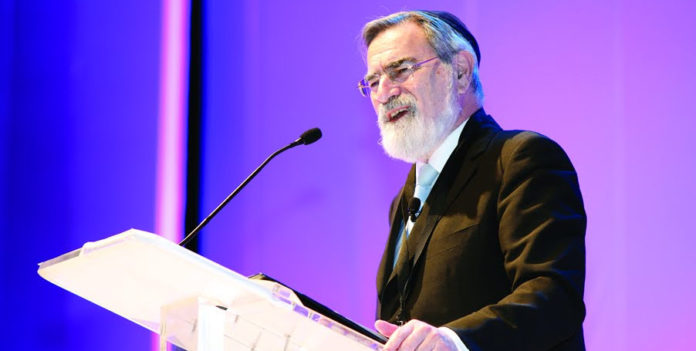 |
Furrow-browed, white-whiskered, impossibly eloquent; Chief Rabbi Lord Jonathan Sacks’ sentences emerge fully formed, his cadence rising and falling as he shifts effortlessly from Rimbaud to the Rambam, the Tosafists to TS Elliot, Bertrand Russell to the Berditcher Rov.
One of the world’s pre-eminent theologians, the UK’s outgoing Chief Rabbi was a guest of South Africa’s Chief Rabbi Dr Warren Goldstein at this year’s Sinai Indaba, capturing the audience’s imagination with his soaring oratory and sweeping spiritual vision. In this wide-ranging interview, he shared his experiences at Sinai Indaba III, and offered his thoughts on some of the challenges facing the contemporary Jewish world.
You spoke via a video link-up at the Sinai Indaba in 2011, and you returned this year as one of Sinai Indaba III’s headline speakers. What would you say is unique about this initiative, and what attracted you to speak at the conference? The Sinai Indaba is uniquely successful in attracting thousands of people to learn Jewish texts and explore Jewish life. I’ve been exceptionally impressed at how it brings together Jews of very different backgrounds and levels of knowledge. It is wonderful to see the range of participants, brought together in this way.
What were your impressions of this year’s Indaba?
It is heartening to witness how this initiative has taken root within the South African Jewish community. This year, the attendance was even higher than in previous years, both in Johannesburg and Cape Town. I was absolutely astonished at the size of the audience. It was impossible not to be moved at this vivid expression of Jewish togetherness. You have visited South Africa numerous times. What are your thoughts on the country and on the South African Jewish community in particular?
The South African Jewish community is altogether remarkable for a number of reasons. First, it is deeply respectful of Jewish tradition. Second, it is solidly and passionately Zionist. Third, it has a higher proportion of Jewish children attending Jewish day schools than perhaps anywhere else in the world. Fourth, different Jewish groups work together, while in most other parts of the world they work separately. Overall, there is a strong sense of communal unity, which is inspiring. This is a very special community — one which stands tall among other Jewish communities of the world.
Tell us a bit about your personal journey. You were a doctoral candidate in philosophy under the mentorship of mostly atheistic Cambridge and Oxford dons, and ended up as Britain’s Chief Rabbi. What happened in between?
I studied philosophy, taught philosophy, and still read and teach it with great interest. I have learnt a great deal from it. But in the end, I came to the conclusion that philosophy does not have substantive answers to the fundamental questions any reflective human being must ask: Who am I? Why am I here? How shall I live? These are not questions that can be answered by reason alone, nor can they be answered by scientific investigation, now or in any conceivable future. I found the most compelling answers in our Jewish heritage, which is why I became a rabbi.
Perhaps on a similar note, you are obviously highly educated and wellversed in Western philosophy and literature. Do you believe there is space for these two spheres to co-exist, and if so, where can it be found?
I have written a book on this subject, called The Great Partnership. Western thought, to the extent that it is the legacy of Plato and Athens, is a very different thing from Jewish thought. I compare it in the book to the left and right hemispheres of the brain. The Greeks gave the world philosophy and science. Jews gave the world the fundamental principles of morality: freedom, choice, responsibility, the sanctity of life, the non-negotiable dignity of the human person, the importance of marriage, the sacred obligations of parenthood, and the idea of a society based on justice, compassion, the love of neighbour and of stranger. I believe that both can coexist, in the same way that speech and song, prose and poetry, system and story, can coexist.
You have spoken about how, over the last few decades, a relentlessly negative Jewish outlook — a preoccupation with the Holocaust, anti-Zionism/antisemitism, and assimilation — has turned many young Jews away from their heritage. What then, do you believe we should be focusing on?
I think to put these things centre stage is, indeed, a mistake. As I mentioned at the Sinai Indaba, Judaism is about life, not death and hope, not tragedy. It is vital that we stop defining ourselves as the people hated by gentiles, and that we start, once again, defining ourselves as the people loved by God.
And we have much to be thankful for and hopeful about. Indeed, today we stand collectively as the Jewish People in a position that we’ve never been in before in all 4000 years of our history. Never before one at the same time have we had independence and sovereignty in the land of Israel, and freedom and equality in the Diaspora.
We stand on the brink of possibilities for which a hundred generations of our ancestors prayed more in hope than in expectation; and what they longed for, we have. I believe that by living as Jews — educated in our Jewishness, confident in our Jewishness and unafraid of any of the challenges of the contemporary world — we can be a blessing to the world, lifting up others by the way we live, and in so doing, inspiring young Jews with an immense and enduring pride.
See pages 6, 10 and 11 for more perspectives on the Chief Rabbi’s talk and the Sinai Indaba. The Chief Rabbi’s latest booklet — ‘A Judaism Engaged with the World’ — is available to download for free at www.rabbisacks.org
Simon Apfel is Creative Director at Bay Moon Communications. His writing can be found at the Daily Maverick, The Wry Republic and the Jerusalem Post.











